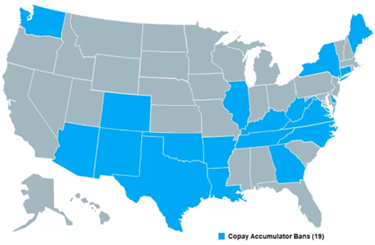- Hemophilia Alliance Welcomes Kollet Koulianos
- What the Data Shows on Copay Accumulator Adjustment Programs
by Jeff Blake, Senior Vice President Member & Community Relations
 Kollet Koulianos has joined the Hemophilia Alliance consulting team as of July 1, 2023. Kollet is an avid supporter of HTCs, the Hemophilia Alliance, Hemophilia Alliance Network Services (HANS) and she will help expand the number of payers (insurance brokers, insurers, stoploss carriers, self-insured employers, and employer coalitions) that we work with, which will help HTCs grow their pharmacy programs. She will add to our ability to offer payer solutions for our member HTCs at no cost to our members. In addition, she will help us fight Alternative Funding, Copay Accumulators/Maximizers, and other related healthcare policy issues.
Kollet Koulianos has joined the Hemophilia Alliance consulting team as of July 1, 2023. Kollet is an avid supporter of HTCs, the Hemophilia Alliance, Hemophilia Alliance Network Services (HANS) and she will help expand the number of payers (insurance brokers, insurers, stoploss carriers, self-insured employers, and employer coalitions) that we work with, which will help HTCs grow their pharmacy programs. She will add to our ability to offer payer solutions for our member HTCs at no cost to our members. In addition, she will help us fight Alternative Funding, Copay Accumulators/Maximizers, and other related healthcare policy issues.
Prior to starting her healthcare consulting firm, P3 Healthcare Benefit Consulting, Kollet was at the National Hemophilia Foundation for over 7 years and most recently was the Vice President Payer relations leading their Payer Relations Team developing and overseeing NHF’s healthcare payer education strategies, policies, and programs, including the Comprehensive Care Sustainability Collaborative (CCSC). Prior to joining NHF, Kollet was the Executive Director of Bleeding & Clotting Disorders Institute (BCDI) in Peoria, IL for almost 5 years.
The Alliance is excited to have Kollet engaged to work with us on the critical issues facing the United States Hemophilia Treatment Center Network (USHTCN). In addition, we will continue to work with NHF and Kollet on various collaborative projects. Please contact Jeff Blake at jeff@hemoalliance.org with any questions.
by Kollet Koulianos, MBA, Hemophilia Alliance Payer Consultant
By now, there is no doubt that our HTC’s are not only well versed on what Copay Accumulator Adjustment Programs (CAAP’s) are, but likely most, if not all, of you have had patients reach out seeking help, given the most recent data published by Avalere1 suggests that 83% of commercial enrollees are on a plan that has copay accumulator language. If you consider that the first CAAP was implemented by a self-funded employer in January of 2017, the uptake has been unprecedented.
From the beginning, we have expressed concern for the unintended consequences that could result for the approx. 55% of chronic disease patients on a high deductible health plan (HDHP)2 given that enrollees must satisfy his/her entire deductible before the plan contributes the first penny; and the fact that deductibles can be as high as $9,100 individual / $18,200 family in 2023. Manufacturers state that they offer patient copay assistance programs to commercially insured patients to reduce a patient’s out-of-pocket cost burden, because frankly they are untenable.
Research conducted by the National Pharmaceutical Council and Xcenda,3 found that increased patient cost-sharing was associated with worse medication adherence (84% of studies), persistence4 (79%) and discontinuation of medicine use (58%). In addition, six of nine (67%) studies found that increased cost-sharing was associated with decreased medication initiation.
The greater the magnitude of patient cost-sharing, the worse the adherence outcomes regardless of the condition, patient population, or type of cost-sharing. This evidence indicates that patients fail to start and continue needed medicines because of the cost burden.
Some evidence also suggests that higher patient cost-sharing for medications was associated with increased hospitalizations and decreased use of outpatient services. Four of six studies showed a significant increase in inpatient hospital utilization associated with higher cost-sharing.
As of today, 19 states (map below) have banned payer and pharmacy benefit manager (PBM) copay accumulator programs.5 These laws apply to state-regulated health plans, including the individual, fully insured large group, and small-group markets. It is possible additional states could join the growing number to pass accumulator laws as several states have yet to wrap up their 2023 legislative sessions.
A poster just presented at the end of June 2023 at the Academy Health ARM2023 conference, suggests that States that have banned the use of copay accumulators saw a decrease in patient out-of-pocket liability and an increase in treatment adherence and persistence.6 For those of you who may still be working to pass legislation in your state, these findings should be beneficial to share with your state legislators looking to reign in PBM games.
Current states with accumulator bans

Because states do not have authority over ERISA plans, federal work is also being done in parallel to the state efforts. H.R. 830 The HELP Copays Act has been introduced by Representative Buddy Carter (R-GA) and currently has 61 bi-partisan cosponsors; and the Senate companion bill S.1375, led by Senator Roger Marshall, MD (R-KS) has also been introduced and currently has 13 bi-partisan co-sponsors.
This article focuses on copay accumulators, not copay maximizers. We will dive into copay maximizers in the coming months. Any questions can be directed to the payer team at the Hemophilia Alliance and for additional resources focused on both accumulators and maximizers visit www.allcopayscount.org
1 Copay Accumulator and Maximizers: Evolving Policy Landscape | Avalere Health
2 National Patient and Caregiver Survey lead by the National Hemophilia Foundation and included the Arthritis Foundation, Kidney Fund, MS Society, Cancer Support and the Aids Institute w results found here: COVID-19 Exacerbates Treatment Affordability Challenges & Health Inequities | National Hemophilia Foundation
3 High Patient Out-of-Pocket Costs Lead to Worse Medication Adherence Without Overall Health Care Savings | National Pharmaceutical Council (npcnow.org)
4 Persistence refers to the period of time from initiation of treatment to discontinuation, whereas adherence refers to the extent in which the patient acts in accordance to the prescribed interval and dosing regimin.
5 State Copay Accumulator Bans Will Affect 19% of US Commercial Lives | Avalere Health
6 Academy Health Poster Activity | John O’Brien LinkedIn
Also in this Issue…
Notes from Joe
· Gene Therapy is Here, Now What?
Notes from the Community
· First Hemophilia Patient to Receive Gene Therapy Outside Clinical Trials
Alliance Update
· Gene Therapy Update Webinar
· Alliance Member Needs Assessment
· Order Your Printed Product Guide NOW!
Advocacy Update
· Washington, DC’s HOT July
Legal Update
· Lawsuits on Implementation of Medicare Drug Pricing Negotiation
